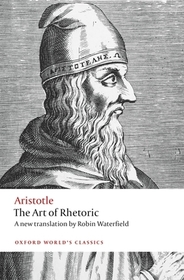
The Art of Rhetoric
Sorozatcím: Oxford World's Classics;
-
10% KEDVEZMÉNY?
- A kedvezmény csak az 'Értesítés a kedvenc témákról' hírlevelünk címzettjeinek rendeléseire érvényes.
- Kiadói listaár GBP 10.99
-
5 250 Ft (5 000 Ft + 5% áfa)
Az ár azért becsült, mert a rendelés pillanatában nem lehet pontosan tudni, hogy a beérkezéskor milyen lesz a forint árfolyama az adott termék eredeti devizájához képest. Ha a forint romlana, kissé többet, ha javulna, kissé kevesebbet kell majd fizetnie.
- Kedvezmény(ek) 10% (cc. 525 Ft off)
- Kedvezményes ár 4 725 Ft (4 500 Ft + 5% áfa)
Iratkozzon fel most és részesüljön kedvezőbb árainkból!
Feliratkozom
5 250 Ft

Beszerezhetőség
Becsült beszerzési idő: A Prosperónál jelenleg nincsen raktáron, de a kiadónál igen. Beszerzés kb. 3-5 hét..
A Prosperónál jelenleg nincsen raktáron.
Why don't you give exact delivery time?
A beszerzés időigényét az eddigi tapasztalatokra alapozva adjuk meg. Azért becsült, mert a terméket külföldről hozzuk be, így a kiadó kiszolgálásának pillanatnyi gyorsaságától is függ. A megadottnál gyorsabb és lassabb szállítás is elképzelhető, de mindent megteszünk, hogy Ön a lehető leghamarabb jusson hozzá a termékhez.
A termék adatai:
- Kiadó OUP Oxford
- Megjelenés dátuma 2018. április 26.
- ISBN 9780198724254
- Kötéstípus Puhakötés
- Terjedelem288 oldal
- Méret 196x129x13 mm
- Súly 205 g
- Nyelv angol 450
Kategóriák
Rövid leírás:
Aristotle's Art of Rhetoric is a treatise concerning the theory and practice of the most dynamic form of discourse in Classical Greece. The Rhetoric was a touchstone for all later ancient writers on the subject, from the Stoics to Cicero.
TöbbHosszú leírás:
For all men are persuaded by considerations of where their interest lies...
Aristotle's Art of Rhetoric is the earliest systematic treatment of the subject, and it remains among the most incisive works on rhetoric that we possess. In it, we are asked: What is a good speech? What do popular audiences find persuasive? How does one compose a persuasive speech? Aristotle considers these questions in the context of the ancient Greek democratic city-state, in which large audiences of ordinary citizens listened to speeches pro and con before casting the votes that made the laws, decided the policies, and settled the cases in court. Persuasion by means of the spoken word was the vehicle for conducting politics and administering the law. After stating the basic principles of persuasive speech, Aristotle places rhetoric in relation to allied fields such as politics, ethics, psychology, and logic, and he demonstrates how to construct a persuasive case for any kind of plea on any subject of communal concern. Aristotle views persuasion flexibly, examining how speakers should devise arguments, evoke emotions, and demonstrate their own credibility. The treatise provides ample evidence of Aristotle's unique and brilliant manner of thinking, and has had a profound influence on later attempts to understand what makes speech persuasive.
The new translation of the text is accompanied by an introduction discussing the political, philosophical, and rhetorical background to Aristotle's treatise, as well as the composition and transmission of the original text and an account of Aristotle's life.
In short, this translation from Waterfield builds on a series of readable and affordable translations from Oxford World's Classics and will no doubt prove valuable to both students and academics. Waterfield has given Aristotle his own colourful voice, if not an even more doddery one, which will prove both entertaining as well as informative to Oxford World's Classics' intended audience.


Robbins & Cotran Pathologic Basis of Disease: With STUDENT CONSULT Online Access
43 544 Ft
37 884 Ft











